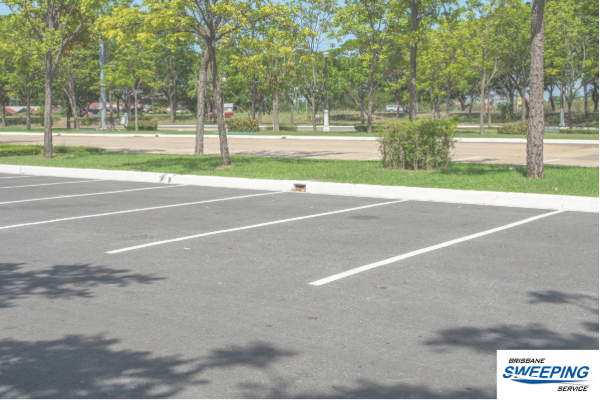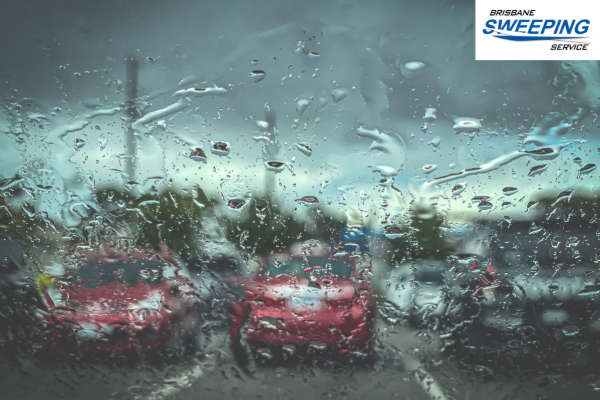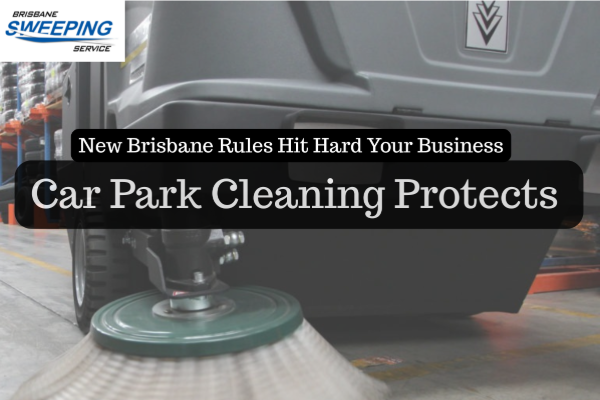Business owners across Brisbane are getting hit with surprise fines and stormwater complaints. What’s going on? Well, it seems car parks have become environmental trouble spots that most people never saw coming.
At Brisbane Sweeping, we've been watching this change happen over the last couple of years. Since we specialise in car park cleaning and industrial sweeping around Brisbane, we get to see up close how pollution actually builds up in these areas.
For businesses, it gets worse. You could face fines or enforcement notices, even if you didn’t realise your site was at risk.
So, let’s discuss why car parks are now on the compliance radar and what you can do about it.
How Your Car Park is Contributing to Water Pollution
Your car park is probably sending pollutants straight into Brisbane's waterways every time it rains. The main issue here is something called urban runoff.

Here's how it works: when stormwater flows across your concrete, it doesn't only wash everything clean like you might think. Instead, it acts like a giant collection system that gathers up contaminated materials and carries them directly into storm drains.
So what exactly is getting washed off your property and into our local rivers? The main pollutants include:
- Oil and grease from parked cars: Every vehicle leaves behind small amounts of engine oil, brake fluid, and other petroleum products.
- Microplastics from tyres: The microplastics (or tiny rubber particles) from tyres come off when cars brake or turn corners.
- Cigarette butts: These filters are made of plastic, and though they seem harmless, they release over 15,000 toxic fibres plus dangerous chemicals like arsenic and nicotine.
- Dirt and construction materials: Loose concrete dust, gravel, and sediment that build up over time.
- Food packaging and general rubbish: Takeaway containers, drink bottles, and plastic bags that blow around your site.
All this contaminated water flows directly into storm drains without any cleaning or treatment. Brisbane's stormwater system then carries these pollutants straight into our rivers and eventually Moreton Bay.
Now that you know how your car park contributes to the problem, let's look at what the regulations say and how they affect your business.
How Brisbane’s Stormwater Laws Work
Brisbane's stormwater laws are pretty straightforward once you understand the basics. The problem is that many business owners have the wrong ideas about what's required, and these misconceptions can lead to some very expensive surprises.

What the law requires
Here's the main rule you need to know: businesses must stop contaminants from getting into stormwater systems. So, you're responsible for managing what gets washed off your property when it rains.
You’re also responsible for keeping the stormwater pipes, gutters, and drains on your property in good shape. The water then has to flow to approved spots, such as Council drains or the street gutter.
So, what happens if businesses don’t follow these rules?
First, you'll usually get a warning or what's called an Environmental Enforcement Order that gives you a specific amount of time to fix the problem. But if you choose to ignore these orders too (not sure why you’d do that), the Council can hit you with instant fines or even take you to court.
Common myths debunked
Now, we can’t talk about pollution without some myth-busting, can we? Here are some of the biggest misunderstandings we often hear.
- "It's just rainwater": This is completely wrong. The moment rainwater flows across your car park and picks up pollutants, it becomes contaminated stormwater that falls under environmental laws.
- "We clean when it looks dirty": Visual cleanliness and regulatory compliance are two different things. Pollution is often invisible, and the regulations focus on preventing contamination before it happens.
- "Council handles all the drainage": This is only half right. While Council does manage public stormwater systems, property owners are responsible for everything within their property boundaries and must connect properly to Council systems.
Property owners vs. tenants: who is responsible?
This is a tricky question to answer because property owners are the ones legally responsible for stormwater compliance, even if tenants are the ones using the space.
That said, lease agreements can make tenants responsible for keeping the area clean, which helps owners meet their legal duties. So, you want to make sure stormwater compliance is included in your lease terms.
But how do you actually stay on the right side of these laws?
How Regular Car Park Cleaning Helps You Stay Compliant
Regular car park cleaning is one of the smartest ways to stay on the right side of Brisbane's stormwater laws and avoid those expensive fines we talked about earlier.
Think about it this way: if you're actively removing pollutants before they can wash into storm drains, you're solving the problem at its source. That's exactly what regulators want to see, and it's much cheaper than dealing with the consequences later.
What counts toward car park cleaning compliance
Professional cleaning companies understand what needs to happen to meet the legal requirements. Here are the key services that you need to know for compliance:
- Scheduled vacuum sweeping: This removes loose rubbish, oil-soaked dirt, and small particles before rain can carry them into storm drains.
- High-pressure degreasing: Regular sweeping can't handle oil stains and automotive fluids, but high-pressure cleaning with proper detergents can break them down completely.
- Catchment zone checks: Catchment zones are the spots around drains where water and debris gather, so keeping them clean helps prevent pollution.
- Sediment removal: Get rid of sediment, like dirt, sand, and construction materials, that can block drainage systems and cause water to pool.
Here's something important to consider: when Brisbane City Council investigates pollution complaints or conducts stormwater inspections, they're looking for evidence that you're taking proper precautions. And what’s better evidence than a well-maintained car park? (The answer is nothing.)
Pro tip: Start a simple cleaning log to record dates, tasks done, and any issues. This record can be valuable during audits and shows Council you’re managing stormwater properly.
Keeping Your Property Compliant and Protected
Now that you know what to focus on, staying compliant with Brisbane’s stormwater regulations should be much easier. Here’s a quick maintenance checklist to get you started:
- Weekly sweeping and debris removal
- Monthly oil spot cleaning and inspection
- Quarterly drain and catch basin clearing
- Annual compliance audit with an environmental services partner
Don’t forget to include compliance-focused professionals in your checklist as well. As professionals, we understand both the cleaning tasks and the environmental rules behind them.
Our team at Brisbane Sweeping can even help you set up a maintenance schedule that keeps you following the rules while staying on budget.
Reach out today and let’s get started.
For More Biography, Gossip, Follow Legends Bio.
















